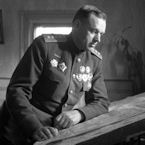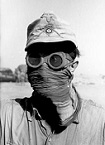janh
Posts: 1216
Joined: 6/12/2007
Status: offline

|
quote:
ORIGINAL: 76mm
Sure Kiev and other disasters were largely caused by bone-headed command decisions, but particularly in the first weeks of the war I think that there should be distinctly more chaos. Morever, even the mistakes were based on a lack of understanding of German capabilities (sometimes by Stalin alone, sometimes by lower commanders), which is itself a form of lack of capability. All of this would be very difficult or impossible to replicate in a game in which players have hindsight and understand their opponent very well.
Not sure how much chaos there should be, or how it should be modeled. My impression from books was more that coordination was an issue, and that often bone-headed orders where given or followed (Stalin's counter attack demand, holding -- it isn't all that much different from boneheaded Hitler orders if such a feature was truly desired, and I would probably want to play without such a hopefully optional rule, no matter what side) in fear of loosing a generals head. That's two very different things, though.
"Forge of Freedom", a civil war game had a rule that simulated misinterpretation or loss of orders. Units had a probability to take a misstep or two, depending on the general's and the "container" ratings (container = staff of corps etc.; I think it was independent of the unit experience, though). At first I thought this a nice feature, but after a while I turned it off. Maybe with a "We-Go" system with simultaneous turn resolution, sort of like the NSD Scourge of Gettysburg where you truly give orders to subordinates and see them interpreted, I would like this more.
Translated it would mean SHC units would be likely to take missteps until their exp (in principle their commanders values...) raised to some value, say 65, and above that missteps are unlikely, yet still happen. Wehrmacht would see them rarely, but imagine your morale 99 LAH taking 3 steps south instead of northwest to close a key pocket... it wouldn't be unreasonable since C&C failures wasn't a purely Soviet issue.
With "missteps", though, a raising of the MPs for SHC would seem necessary as I understand the low MPs do actually cover this case, as well as poor coordination (often insufficient MPs to generate "deliberate", well-organized attacks with numerous stacks).
What could perhaps be implemented in easier fashion in WitE/WitW might be more "coordination penalties", i.e. what I believe the Soviets suffered most from: for e.g. a deliberate attack by stacks of SHC randomly breaking down in sequential single attacks, with predictable outcome. Again the question would be whether that isn't basically covered by the low MPs, or whether it would be better to have higher MPs (i.e. lower morale dependency on MPs) and instead more often suffer unforeseen failures.
Perhaps rather the true inadequacy of Soviet C&C in summer of 41, what you (or Helio) are truly missing is an impression, a surprise effect of things falling randomly apart, in contrast to having everything sort of "orderly" determined and controlled by the MP value?
< Message edited by janh -- 10/4/2012 4:30:08 PM >
|
 Printable Version
Printable Version











 New Messages
New Messages No New Messages
No New Messages Hot Topic w/ New Messages
Hot Topic w/ New Messages Hot Topic w/o New Messages
Hot Topic w/o New Messages Locked w/ New Messages
Locked w/ New Messages Locked w/o New Messages
Locked w/o New Messages Post New Thread
Post New Thread